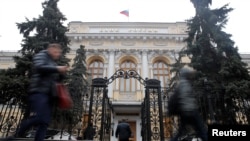ເປັນເທື່ອທຳອິດນັບແຕ່ປີ 1918 ເວລາ ວລາດີເມຍ ເລນິນ (Vladimir Putin) ປະຕິເສດບໍ່ຮັບຮູ້ໜີ້ສິນ ຂອງອະ ດີດມະຫາອານາຈັກຣັດເຊຍ ຣັດເຊຍໄດ້ຜິດນັດໃນການຈ່າຍໜີ້ສິນທີ່ຕົກຄ້າງຢູ່ນັ້ນ. ຣັດເຊຍໄດ້ກະທຳ ການດັ່ງກ່າວ ໂດຍບໍ່ຈ່າຍເງິນປະມານ 100 ລ້ານ ທີ່ເປັນເງິນໂດລາ ແລະເງິນຢູໂຣ ໃຫ້ແກ່ບັນດາຜູ້ອອກພັນທະບັດ.
ຄວາມຜິດນັດໄດ້ເກີດຂຶ້ນກ່ຽວກັບວ່າ ບໍ່ແມ່ນຣັດເຊຍຂາດເຂີນເງິນສົດ ລັດຖະບານຂອງທ່ານວລາດີເມຍ ປູຕິນ ໄດ້ກຳໄລຢ່າງງົດງາມ ຈາກລາຄາພະລັງງານຂຶ້ນຫວ່າງມໍ່ໆມານີ້ ແຕ່ເພາະວ່າ ບັນດາປະເທດຕາເວັນຕົກລົງ ໂທດກ່ຽວກັບສົງຄາມ ຢູ່ໃນຢູເຄຣນໄດ້ເຮັດໃຫ້ເກືອບວ່າເປັນໄປບໍ່ໄດ້ສຳລັບຣັດເຊຍໃນການເຂົ້າ ຫາເງິນຕາ ຕ່າງປະເທດ ໃນຈຳນວນທີ່ຕ້ອງການເພື່ອຈ່າຍຄ່າໜີ້ສິນຂອງຕົນ.
ການຈ່າຍເງິນທີ່ເປັນຄຳຖາມ ມີກຳນົດໃນເດືອນແລ້ວນີ້ ແຕ່ວ່າໄລຍະການໂຍະຍານ 30 ມື້ ໄດ້ສິ້ນສຸດລົງໃນວັນອາທິດທີ່ຜ່ານມາຈຶ່ງເຮັດໃຫ້ເກີດຜິດນັດ. ຫລັງຈາກຣັດເຊຍໄດ້ຮຸກຮານຢູເຄຣນ ແລະການລົງໂທດຢ່າງກວ້າງຂວາງ ຕໍ່ເສດຖະກິດຣັດເຊຍແລ້ວ ກະຊວງການເງິນສະຫະລັດ ໄດ້ອະນຸຍາດໃຫ້ມີການຍົກເວັ້ນ ບັນດາກົດລະບຽບ ທີ່ຂັດຂວາງຣັດເຊຍບໍ່ໃຫ້ໃຊ້ການບໍລິການຈ່າຍເງິນສຳລັບຕ່າງປະເທດ ເພື່ອອະນຸຍາດໃຫ້ວັງເຄຣມລິນ ເຮັດການຈ່າຍເງິນແກ່ໜີ້ສິນ. ການຍົກເວັ້ນໄດ້ໝົດກຳນົດໃນເດືອນພິດສະພາທີ່ຜ່ານມາ.
ລັດຖະມົນຕີການເງິນຣັດເຊຍ ທ່ານແອນເຕິນ ຊິລົວນອຍ (Anton Siluanoy) ໄດ້ປະຕິເສດວ່າ ຄວາມຜິດນັດ ທີ່ຈະເຮັດການໃຊ້ຈ່າຍແມ່ນຄວາມຜິດພາດທີ່ບໍ່ແທ້ຈິງ. ຣັດເຊຍໄດ້ຈ່າຍຈຳນວນເງິນທຽບເທົ່າກັບເງິນຣູໂບລ ເຂົ້າສູ່ບັນຊີຢູ່ໃນທະນາຄານຣັດເຊຍ ທີ່ເປີດຢູ່ໃນບັນດາຊື່ຜູ້ໃຫ້ຢືມ. ເຖິງຢ່າງໃດກໍດີ ເພາະວ່າການລົງໂທດສາ ກົນແກ່ບັນດາທະນາຄານຣັດເຊຍ ມັນຈະມີຄວາມລຳບາກ ຫລືເປັນໄປບໍ່ໄດ້ສຳລັບບັນດາຜູ້ໃຫ້ຢືມໃນການເຂົ້າ ຫາກອງທຶນ.
ຢູ່ໃນຖະແຫລງການທີ່ລາຍງານໂດຍອົງການຂ່າວບລຸມເບີກນິວສ໌ (Bloomberg News) ທ່ານຊິລົວນອຍ ກ່າວວ່າ “ບັນດາຜູ້ຊ່ວຍທຸລະກິດຢູ່ຕ່າງປະເທດ ໄດ້ປະຕິເສດຈ່າຍເງິນໃນເງິນຕາຕ່າງປະເທດ ສຳລັບພວກເຮົາແລ້ວແມ່ນການບັງຄັບໃຫ້ອອກຈາກສະພາບການ. ແລະມັນເປັນເຫດຜົນທີ່ແຈ້ງຂາວ ທີ່ພວກເຮົາປ່ຽນການຈ່າຍມາເປັນເງິນຣູໂບລ.
ຄຳວ່າ “Force majeure” ອ້າງເຖິງການຂໍ້ກຳນົດທີ່ມີຢູ່ໃນຫລາຍໆສັນຍາ ທີ່ປ່ອຍໃຫ້ທຸກພັກຝ່າຍອອກຈາກຄວາມຮັບຜິດຊອບທີ່ເໜືອໄປກວ່າການຄວບຄຸມຂອງເຂົາເຈົ້າ. ພັນທະດັ່ງກ່າວຍັງມີຜົນບັງຄັບ ແລະຕ້ອງໄດ້ ປະຕິບັດ ໃນເວລາທີ່ເປັນໄປໄດ້ທີ່ຈະເຮັດ.
For the first time since 1918, when Vladimir Lenin repudiated the debts of the former Russian Empire, Russia has defaulted on its sovereign debt. It did so by failing to make a payment of approximately $100 million in dollars and euros to bondholders.
The default came about not because Russia is short of cash — Vladimir Putin's government is profiting handsomely from the recent surge in energy prices — but because Western sanctions over the war in Ukraine have made it virtually impossible for Russia access foreign currencies in the volume required to service its debts.
The payments in question were due last month, but a 30-day grace period ended on Sunday, triggering the default. After Russia invaded Ukraine and widespread sanctions were applied to the Russian economy, the U.S. Treasury had allowed an exception to rules blocking Russia's use of international payment services to allow the Kremlin to make its debt payments. That exception expired in May.
Russia blames sanctions
Russian Finance Minister Anton Siluanov has denied that the failure to make payments is a true default. Russia has paid the equivalent amount of money, in rubles, into accounts in Russian banks opened in the names of its creditors. However, because of international sanctions on Russian banks, it will be difficult or impossible for those creditors to access the funds.
In a statement reported by Bloomberg News, Siluanov said, "Overseas counter-agents have refused to make payments in foreign currencies, which for us is a force majeure situation. And it's purely for this reason that we are switching to payments in rubles."
The term "force majeure" refers to a clause common in many contracts that frees parties from liability if forces beyond their control prevent them from fulfilling their obligations. The obligations remain in place and must be fulfilled when it becomes possible to do so.




